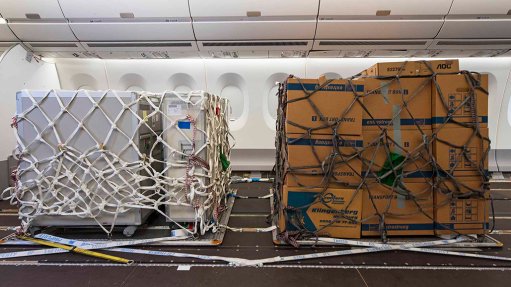
Cargo pallets locked on to cabin floor seat tracks on an Airbus airliner
Photo by: Airbus
Europe-based global major aerospace group Airbus has announced that it has developed a modification that allows its A330-family and A350-family widebody airliners to safely carry cargo pallets on their passenger decks, in place of seats. The pallets can be secured to the cabin floor seat tracks, in place of economy-class seats.
The severe air travel restrictions imposed by many countries, in attempts to contain the Covid-19 pandemic, have resulted in the large-scale grounding of widebody airliners. This, in turn, has resulted in a shortage of air cargo capacity, most air cargo being carried in the cargo holds of airliners and only a minority by dedicated freighter aircraft.
Yet air cargo needs to continue to flow. Not least, there is great demand for humanitarian flights carrying medical equipment and supplies over long distances. Airlines have even been putting cargo on to passenger seats in their aircraft.
“Compared with loading cargo on to seats, this Airbus solution facilitates easier and quicker loading and unloading operations, as well as reduced ‘wear and tear’ to the seats themselves,” states the company. “Other important benefits include the added security of robust fire protection, and the 9g load restraint capability to prevent anything from shifting in flight.” (The term ‘9g’ means the load restraints can withstand forces equivalent to nine times the force of gravity on the Earth’s surface.)
The modification includes the removal of the in-flight entertainment (IFE) system and the seats, as well as the fitting of the cargo pallets and the related safety systems. It also covers the re-installation of the seats, IFE and other elements, for a return to passenger operations.
The cabin cargo modification takes the form of an Airbus Service Bulletin. “Under this arrangement Airbus defines the engineering workscope and also manages the process for obtaining the one-time certification from the European Union Aviation Safety Agency,” explains the group. This approach will remain valid after the pandemic.